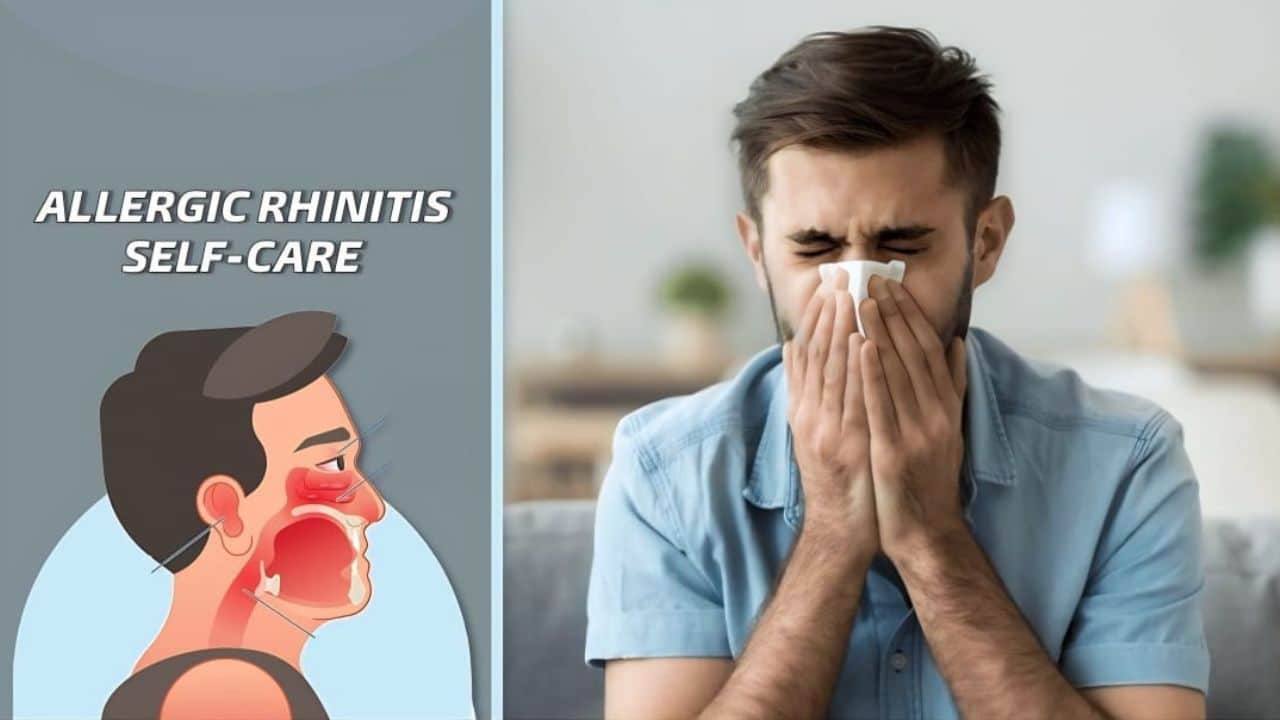Are you tired of feeling congested, itchy, and sneezing due to nasal allergies? Allergic rhinitis more commonly known as hay fever or seasonal allergies affects an estimated 1 in 5 adults in the United States. Those with allergies may experience extreme discomfort from their symptoms, leading to missed workdays and significant costs for healthcare. If you’re looking for ways to help manage allergic rhinitis naturally, this post has everything you need to know about allergic rhinitis self-care.
From understanding your condition and medical treatments available on the market today to lifestyle changes and self-care techniques that can reduce allergy symptoms: we will cover all aspects of managing perennial and seasonal allergic rhinitis safely at home so that readers can find lasting relief from their unpleasant symptoms.
Let’s explore the comprehensive guide together!
- Allergic rhinitis (hay fever) causes sneezing, stuffy nose, and itchy eyes due to an allergic reaction to inhaled substances like pollen or pet dander.
- Identifying your specific triggers through allergy testing allows you to better avoid exposure to those allergens.
- Lifestyle changes like keeping windows closed, using air filters, and washing bedding regularly can reduce contact with indoor allergens.
- Medications like antihistamines and nasal sprays can provide symptom relief but overuse can make problems worse.
- Pharmacists play a key role in advising about proper medication use, and non-drug approaches, recognizing allergy triggers, and addressing patients’ questions.
Explanation of Allergic Rhinitis
[Video Credits @OsmosisfromElsevier]
Allergic rhinitis, more commonly known as hay fever or seasonal allergies, is an inflammatory condition of the nose and nasopharynx caused by exposure to inhaled allergens. Common symptoms include sneezing, itching of the nose and eyes, nasal congestion/discharge, sore throat/mouth, and coughing.
These symptoms can be triggered by environmental factors such as pollen from trees, grasses, or weeds; dust mites in carpeted areas; pet dander; feathers; mold spores; aerosol sprays that contain gluten-based proteins; chemicals used in cleaning products, etc.
Allergic rhinitis should not be confused with nonallergic rhinitis which may have similar symptoms but is a different condition altogether due to its nonspecific causes. It is important to identify triggering allergens through a series of allergy tests so that one can start ministering self-care strategies for relief from these uncomfortable allergies.
Importance of Self-Care
Self-care is an important part of managing allergic rhinitis and reducing allergens at home. Inadequately controlled symptoms are a recognized risk factor for the development of asthma, making self-care strategies such as identifying triggers and avoiding allergen exposure key components in prevention.
Lifestyle modifications like covering windows at night or using air conditioners with HEPA filters can reduce exposure to allergens significantly, while allergy testing can be instrumental in understanding exactly what triggers symptoms and determining personalized strategies for avoiding them.
Appropriate medication use may help relieve uncomfortable symptoms and restore quality of life both preventative approaches, like antihistamines taken before allergen encounters (like those found during pollen season), and short-term relief options (including nasal sprays), may be used under the guidance of a healthcare professional. The pharmacist’s role should also not be overlooked, especially concerning general advice on proper medication use as well as addressing common concerns regarding any allergies individuals may have.
Understanding Allergic Rhinitis
A thorough understanding of what allergic rhinitis is and its causes, different types, and symptoms gives us a better foundation for effective self-care management.
Definition and Causes
Allergic rhinitis, commonly known as seasonal allergies, occurs when someone’s immune system mistakenly responds to harmless particles in the air, like pollen or pet dander, and releases immunoglobulin E (IgE) antibodies. These antibodies play a role in releasing chemicals like histamine in the body, causing physical reactions associated with allergy symptoms.
Common triggers for allergic rhinitis include pollen from trees and grasses in spring/summer, ragweed in the fall, dust mites in bedding and furniture, animal dander from cats, dogs, or other pets, mold spores in damp areas like bathrooms or basements, cockroaches commonly found in kitchens or basements, and products like soaps, detergents, and perfumes with fragrances, along with exposure to cold temperatures.
Different Types
Allergic Rhinitis is an inflammation and swelling of the mucous membranes inside the nose caused by inhaled allergens, such as dust, pollen, and mold spores. It has a wide range of types Seasonal Allergic Rhinitis (SAR) or Hay Fever, Perennial Allergic Rhinitis (PAR), Occupational Allergic Rhinitis (OAR), and Non-allergenic Rhinitis.
Seasonal Allergic Rhinitis (Hay fever) occurs seasonally due to the presence of seasonal pollens from trees, weeds, and grasses in the air. Symptoms include sneezing fits; stuffy nose; itchy eyes; runny nose or post-nasal drip.
Perennial Allergic Rhinitis occurs throughout the year due to exposure to indoor sources such as pet dander, dust mites, and cockroach droppings that remain present all year round. Its symptoms can overlap with those of SAR but are usually milder.
Symptoms to Look Out for
Allergic rhinitis, also known as hay fever, is the result of an allergic reaction to certain airborne allergens such as pollen or animal dander. The most common symptoms of allergic rhinitis are nasal itching, sneezing, watery nasal discharge, and a blocked nose.
However other symptoms can include allergic conjunctivitis, headaches, and impaired smell which may significantly impact quality of life if left uncontrolled. It’s important to be able to recognize these signs early on to take action through self-care management such as avoiding triggers and seeking appropriate medical advice for medicated relief when necessary.
People may find that environmental lifestyle changes can help reduce exposure to indoor allergens responsible for causing an attack too., such as cleaning bedding regularly and using air purifiers with HEPA filtration systems in bedrooms.
Allergy Testing to Identify Triggers
To reduce the risk of unnecessary harm from consuming an allergen, allergy testing is a reliable way to accurately and quickly identify potential triggers for allergic rhinitis.
Types of Allergy Testing
Allergy tests can help you identify the allergens behind your symptoms, giving you guidance on what to avoid and how to manage your chronic rhinitis. Depending on the type of incident, allergy testing methods can vary from skin prick tests and blood tests to allergen challenge testing.
Skin prick tests directly expose a small portion of the skin (typically the arm or back) to suspected allergens via applications applied through a prick. Blood tests measure levels of IgE antibodies produced in response to an allergen that interacts with your body’s immune system; raised levels suggest an allergic reaction may be present.
Allergen challenge testing exposes patients directly to known triggers in controlled conditions for diagnosis, though this procedure is best reserved for those who are experienced in handling allergic reactions and are supervised by medical personnel.
How to Prepare for Testing
Allergy testing is a relatively straightforward process, usually with minimal preparation. However, there are some considerations you should keep in mind before undergoing testing.
For skin prick tests or intradermal tests, it’s important to discontinue any antihistamines for at least three days before the test so that they don’t interfere with the results. Certain medications such as steroids may also affect the accuracy of the test and could lead to false positives, so be sure you understand how your current medications may impact the test results if necessary.
Lastly, make sure that areas where allergy injections will be administered are free from creams or ointments which can impede the absorption of antigens into your system during an inhalant immunotherapy (allergy shot) session.
Interpreting Results
It is important to have a clear and accurate understanding of allergy test results for proper diagnosis and treatment of allergic rhinitis. A positive result indicates a significant level of allergen sensitization, whereas negative results indicate that the tested material does not cause an immediate immune response.
For example, if dust mites are identified as triggers through testing or other means such as environmental monitoring, the patient should avoid environments high in dust mite activity (bedsheets, furniture, tightly sealed homes).
If elevated levels of cat dander are detected in the individual’s home environment but the patient does not show signs of sensitization on allergy testing then attempts should be made to limit exposure from sources inside and outside the home.
Interpreting these results can inform lifestyle changes such as avoiding specific allergens or reducing long-term exposure where possible; it can also help guide medication decisions. Patients with severe allergic symptoms may consider intranasal corticosteroids such as Flonase to minimize nasal inflammation while topical agents like antihistamines (e.g., Claritin) reduce nasal congestion caused by histamine release.
Allergic Rhinitis Self-Care: Differential Diagnosis
To differentiate allergic rhinitis from other conditions, detailed medical examination and accurate diagnosis are essential to inform management. Read on to explore more differentiating features and when to seek medical advice.
Differentiating From Other Conditions
Proper diagnosis of allergic rhinitis is essential to ensure proper treatment and management. While the signs and symptoms of seasonal allergies may be similar to those associated with other conditions, such as a cold or sinus infection, they are very different.
Colds typically produce more thick viscous nasal discharge than allergies and can last up to 2 weeks due to viral causes. In contrast, symptoms associated with allergic rhinitis appear shortly after exposure to allergens and usually do not exceed a few days or weeks in duration when properly managed. Allergy testing can confirm the presence of specific allergy-triggering proteins through skin prick tests or blood tests, whereas alternate diagnoses may require swab testing for bacteria or imaging studies if indicated by history and physical exam.
Because it is important for patients suffering from AR-related problems* to identify their triggers appropriately so that suitable allergen avoidance measures can be implemented, seeking medical attention if over-the-counter medications fail is strongly recommended to determine the cause behind persistent allergic reactions.
When to Seek Medical Advice
When managing allergic rhinitis with self-care, it is important to be aware of the limitations of over-the-counter medications. If symptoms are affecting everyday activities or worsening despite home remedies and medications, medical advice should be sought.
It may be necessary to seek a diagnosis and allergy testing to identify environmental triggers causing the condition. A physician can also provide appropriate medication management for severe outbreaks that cannot adequately be managed by OTC treatments alone.
For individuals with chronic allergy symptoms, long-term management such as nasal irrigation systems or prescription medications may be recommended or immunotherapy might even need to be considered.
Finally, when one experiences any other signs and symptoms beyond common cold effects like nosebleeds, asthma attacks, or wheezing accompanied by allergic reactions; an Emergency Room visit is highly recommended.
Lifestyle Changes for Managing Allergic Rhinitis
An essential part of managing allergic rhinitis is making lifestyle changes that reduce your exposure to allergens and manage the symptoms. Read on to learn more!
Avoiding Triggers
To minimize the occurrence of nasal allergy symptoms, it is important to identify and avoid any triggers that may be causing them. The first step in this process is environmental control. This can include avoiding outdoor irritants such as pollen or air pollution as much as possible by staying indoors when levels are highest, wearing a face mask outdoors, and using an air purifier indoors.
Nasal irrigation with salt water helps flush away allergens from nasal passages which can reduce inflammation and prevent irritation. Proper diagnosis to determine exactly what allergies one has is also essential since only then can one truly avoid exposure to their known triggers by avoiding areas where those substances exist or removing items from around them that could trigger reactions.
In terms of self-care management for allergic rhinitis sprays containing phenylephrine should be used cautiously since overusing decongestant sprays can worsen symptoms over time due to something called rhinitis medicamentosa. Instead a gentle saline spray may help keep nasal passages moist and wash away allergens easily instead of drying other tissue in the nose which would make symptom worsening more likely.
Managing Indoor and Outdoor Environments
One of the best ways to reduce exposure to allergens that trigger nasal allergies is by managing your indoor and outdoor environments. Indoor measures such as keeping the windows closed during high pollen seasons, using air purifiers, and regularly cleaning and vacuuming carpets can help reduce dust mites and other allergen particles in the home.
For outdoor areas like yards, decks, or balconies, planting trees and shrubs away from doors or windows will block out winds carrying allergens. Open up those areas only after flowers have finished blooming for the season so debris from pollinating plants doesn’t enter your living space.
By reducing potential sources of allergy triggers through basic environmental management strategies at both home and work, those with allergic rhinitis can experience improved symptom control without relying on more aggressive treatments like medicines.
Reducing Exposure to Allergens
is key to managing allergic rhinitis. This means avoiding contact with dust mites, pet dander, mold, and pollen as much as possible. It can be difficult to avoid these allergens altogether since they are all present in the environment, but there are steps you can take to limit their impact on your health.
To start with, keep windows closed during peak times of the day when pollen counts are high outside; this prevents airborne allergens from coming inside your home or workspace. At home try using a dehumidifier as well which will lower the amount of mold spores in the air that cause allergy symptoms to flare up.
Vacuuming and dusting regularly helps reduce levels of indoor irritants like pet dander and dust mites too. If you’re going out for prolonged periods outdoors such as hiking or gardening use an appropriate face mask that protects against pollen particles entering your nasal passage keeping those troublesome allergies away!
Finally staying informed about local weather conditions is important especially during pollinating season so you know when it’s safe to exercise outdoors without fear of having severe allergy attacks afterward.
Medication Options for Allergic Rhinitis
There are a variety of medications available for the treatment of allergic rhinitis, including antihistamines, corticosteroids, decongestants, and more. Understand which one may be right for your symptoms and know about potential side effects to avoid any adverse reactions.
Types of Medications Available
The different types of medications used to manage allergic rhinitis include over-the-counter (OTC) and prescription drugs. OTC options available for the treatment of allergic rhinitis are antihistamines, decongestants, combination products that include both antihistamines and decongestants as well as nasal sprays containing corticosteroids.
Prescription treatments such as steroid nasal sprays, oral steroids like prednisone or methylprednisolone, leukotriene receptor antagonists (LTRA) like montelukast, and specific allergen immunotherapy can also be prescribed to help reduce symptoms.
There is a wide variety of OTC medication one may take including diphenhydramine, loratadine fexofenadine, chlorpheniramine alergsKpseudoephedrine or ephedrine combinations. They work by blocking histamine production which causes swelling in the sinuses allowing for easier breathing when airways become congested due to allergies.
How They Work
Prescription and over-the-counter (OTC) medications are available to treat the symptoms of allergic rhinitis. OTC medications, such as antihistamines, decongestants, and nasal sprays containing corticosteroids control histamine production in the body which reduces inflammation and swelling.
Corticosteroid nasal sprays reduce inflammation further helping with congestion, itchiness, and sneezing. Prescription allergy shots or sublingual immunotherapy can provide long-term relief by reducing sensitivity to allergens causing allergic reactions.
They work by administering small doses of an allergen into the body building up a level of immunity that fights against future exposure to similar allergens. Allergy shots involve injections whereas sublingual immunotherapy requires treatment drops dissolved under the tongue several times per week for six weeks only.
Possible Side Effects
Nasal sprays and other medications for treating allergic rhinitis can cause side effects, ranging from mild to more serious ones. Common side effects of nasal sprays include irritation in the nose,oxymask runny noses, sneezing attacks that last longer than usual, itching of the eyes or nose along a burning sensation inside the nose after using spray implements.
It is also common to experience headaches following the use of intranasal corticosteroids such as beclomethasone dipropionate (Beconase), triamcinolone acetonide (Nasacort) and mometasone furoate (Nascort).
People with any existing heart conditions may experience certain symptoms like an irregular heartbeat on taking oral antihistamines like cetirizine hydrochloride (Zyrtec). In rare cases, combinations of KEYWORDS Nasal Steroids prednisolone can lead to adrenal gland problems such as Addison’s Disease if used for a prolonged period without consulting their physician first.
Non-Pharmacologic Approaches
Exploring alternative treatments, such as nasal washes and saline sprays, steam therapy, and allergy-proofing your home can help relieve the symptoms of allergic rhinitis.
Nasal Washes and Saline Sprays
are non-pharmacological approaches for managing allergic rhinitis that can help reduce symptoms such as congestion, sneezing, and rhinorrhea. Nasal washes involve flushing the nasal passages with a saltwater solution while saline sprays introduce a small amount of saline to the nose.
These over-the-counter treatments offer an effective way to clear out allergens, bacteria, and excess mucus from the nasal passages and sinuses without medication. Taking careful steps when using these treatments is important too much force or frequent use could cause damage to delicate tissue in the nose! They are generally considered safe for adults and children over 12 years old; however, people with severe allergies should consult their healthcare provider before administration.
Furthermore, since they do not address direct allergen exposure it’s important to take precautions outdoors -such as avoiding outdoor activities during high pollen hours or wearing face masks to reduce allergen exposure overall.
Steam Therapy
Steam therapy is an effective non-pharmacologic approach to treating nasal allergies, and a great home remedy for those who don’t want the hassle of shopping for medications. Steam helps open up airways, reduce congestion in the nose and sinuses, relieve inflammation of the mucous membranes in the nose and throat, as well as reduce watery eyes by loosening blocked mucus.
This can alleviate itching caused by airborne allergens such as dust mites and pollen while helping heal irritated nasal tissues so that they feel less itchy. When done right, steam therapy can provide relief from symptoms associated with allergic rhinitis such as sneezing due to its ability to hydrate the airway passages which helps loosen crusts and thins out thick secretions. Additionally, this kind of treatment has been proven to draw away toxins from inside your body making way for healthier skin functioning.
Allergy-Proofing Your Home
Allergy-proofing your home is an important step in the self-care management of allergic rhinitis. To prevent exposure to allergens, be sure to keep living spaces clean and well-ventilated.
This may involve frequently vacuuming carpets or mopping floors with a damp mop and adjusting air conditioning or heating systems accordingly. In addition, using allergen-proof bedding such as hypoallergenic mattress covers and pillowcases can reduce dust mite exposure while thick curtains can prevent pet dander from entering the room through windows.
For more complete control over indoor allergens, install an air purifier equipped with a HEPA (High-Efficiency Particulate Air) filter to remove airborne particles like pollen, mold spores, and pet dander circulating within the home environment.
Role of the Pharmacist
Pharmacists provide expert guidance for self-care management of allergic rhinitis, helping patients improve their quality of life and reduce long-term risk.
Counseling Patients on Self-Care Management
A key role of the pharmacist is to provide counsel for self-care management to people who suffer from allergic rhinitis. Pharmacists can offer advice on recognizing and avoiding triggers, at-home strategies for managing indoor and outdoor environments, medication options that are available both over-the-counter and by prescription, non-pharmacologic approaches such as nasal washes or steam therapy, and other practical lifestyle changes that can help reduce exposure to allergens.
They should also be able to explain symptoms associated with different stages of allergic rhinitis (such as congestion, sneezing, and redness around the eyes), proper medication use (dosage instructions related to each type of drug available), potential side effects of treatment (drying mouth effect), and general safety standards related to its administration (intranasal medications).
While they cannot diagnose or treat people directly themselves due to their limited scope in most areas, pharmacists possess a great deal of knowledge about allergies which makes them an invaluable source for providing quality care when it comes to self-management.
Recommending Proper Medication Use
When it comes to managing nasal allergies, medications can be an effective way of treating symptoms. There are several types of medications available, from over-the-counter (OTC) treatments such as antihistamines and decongestants to prescription-strength steroid nasal sprays.
OTC treatments provide temporary relief for mild allergic rhinitis but should not be taken instead of a doctor’s recommendation as regular use can lead to increased or worsened symptoms known as ‘rebound congestion’.
Prescription medications like intranasal corticosteroids provide long-term control of inflammation within the nose and sinuses by targeting and eliminating specific allergy triggers with minimal side effects.
Addressing Concerns and Questions
Patients need to have their questions and concerns addressed when it comes to self-care management of allergic rhinitis. While the pharmacist is in a great position to help guide patients through this process, there are still many queries that individuals may have that can remain unanswered.
Common concerns and questions that people might ask include whether they should consider allergy shots or sublingual immunotherapy, what types of antihistamines and decongestants are available over-the-counter, how long they should continue using medication for before seeing improvement, or if lifestyle modifications such as reducing exposure to allergens must be made.
Patients should feel free to speak actively with their healthcare provider about any worries related to treatment plans or medications. The pharmacist too can provide much insight into these issues by empowering patients with knowledge through educational materials or digital resources about treatment options, side effects associated with drugs, tips on avoiding triggers in daily life, and other strategies such as nasal irrigation for relieving suffering from allergy symptoms.
Best Tips to Manage Rhinitis Symptom
Natural Ways
- Increase hydration and eat anti-inflammatory foods like fatty fish, leafy greens and berries
- Try natural supplements like butterbur, spirulina, or quercetin
- Apply a cold compress with ice or wet washcloth
- Use peppermint oil
- Try neti pot nasal irrigation
Home Remedies
- Freeze wet washcloth for a cold compress
- Apply hot packs for facial pressure relief
- Sleep elevated with extra pillows
- Shower after coming indoors
- Limit morning outdoor exercise
- Close windows and use A/C
- Wash bedding in hot water
Medications
- Take antihistamine pills
- Use prescription nasal steroid sprays
- Apply lubricating eye drops
Around the House
- Increase home cleaning
- Use HEPA air purifiers and dehumidifiers
- Dust-proof mattress and pillow covers
- Avoid heavily fragranced products
- Hang laundry indoors
Outdoors Protection
- Wear dust mask when pollen count is high
- Wear wraparound sunglasses outside
- Consider allergy shots from your doctor
Frequently Asked Questions (FAQs)
Now, let’s find out some things people often ask about allergic rhinitis self-care.
1. What is the fastest way to cure allergic rhinitis?
Allergic rhinitis doesn’t have a cure, but using nasal sprays and antihistamine medications can help reduce its effects. A doctor might suggest immunotherapy, a treatment that gives long-term relief. You can also take steps to avoid things that trigger your allergies.
2. What is the permanent solution of allergic rhinitis?
To permanently address allergic rhinitis, if you have allergies, fixing them with immunotherapy can improve or permanently resolve your allergic rhinitis. If you have something called vasomotor rhinitis, we can also give you a medicine that helps fix it.
3. Does allergic rhinitis go away?
Sometimes, the symptoms of allergic rhinitis get better over time, but it might take many years, and it’s not very likely that the condition will go away entirely.
4. What can stop allergies?
If you have seasonal allergies, a helpful starting point is using antihistamines. These medications block a chemical called “histamine” that your immune system releases when it thinks there’s something harmful. For seasonal allergies, your immune system is reacting strongly to certain things, and antihistamines help calm down this response.
Disclaimer: This content is for informational purposes only and does not replace professional medical advice, diagnosis, or treatment. This information is not comprehensive and should not be used to make health or well-being decisions. Consult a qualified healthcare professional with questions about a medical condition, treatment options, or health regimen. This website or the content should never replace professional medical advice.








































